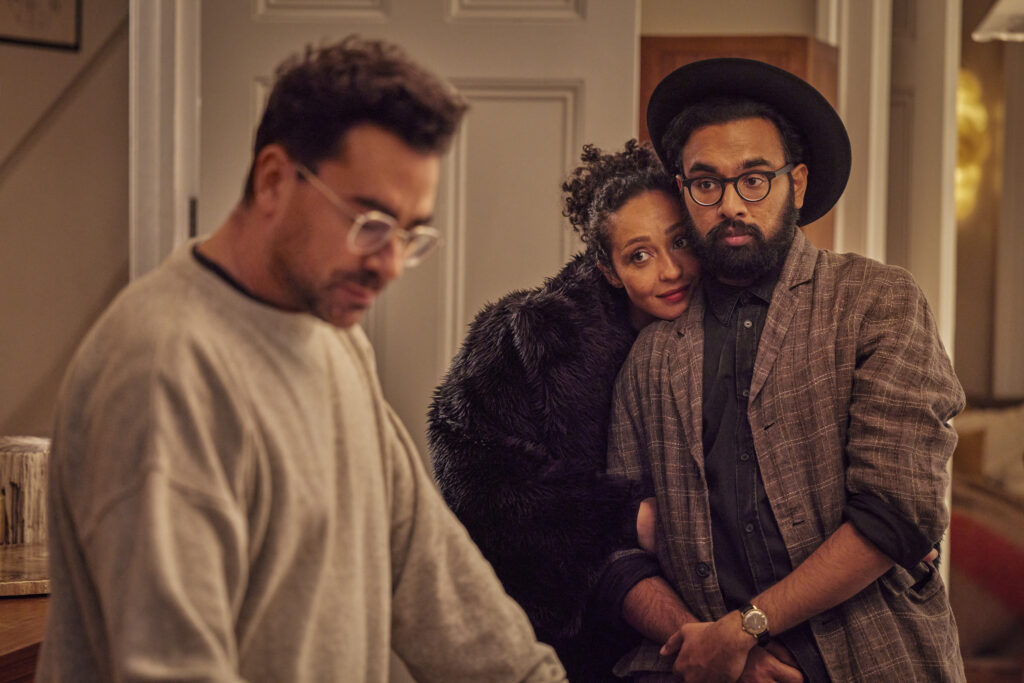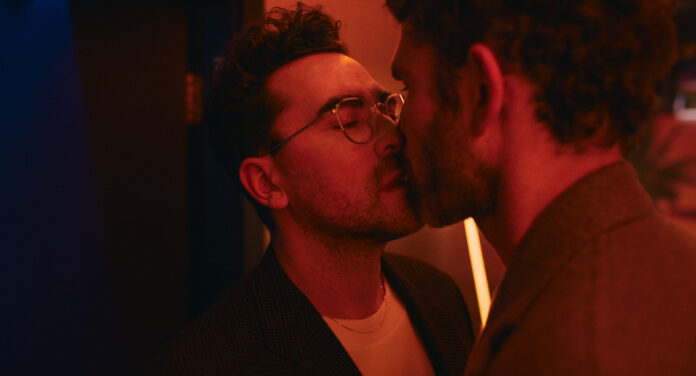Daniel (Dan) Levy’s feature directorial debut, “Good Grief,” aches with melancholy and throbs with poignancy. The sentimental film — which Levy also wrote — centers on loss and healing, as well as love, friendship and relationships. Viewers who cozy up to this sad romance will embrace it like one of the oversized sweaters Levy wears in the film.
The drama, which begins streaming Jan. 5 on Netflix, opens with Marc (Levy) and his husband Oliver (Luke Evans) throwing a Christmas party in their London flat. Oliver, who is a fabulously successful writer of a popular book series — hence the couple’s wealth — leads the guests in song. The joyful sequence captures the warm feeling that soon goes ice cold. Just as he is heading out to Paris for a book signing, Oliver’s cab is hit, and he is killed.
“Good Grief” tracks the aftermath of this tragedy from Marc’s heartfelt memories of Oliver to a painful service where an actress (Kaitlyn Dever) delivers an inappropriate eulogy that is meant to be darkly amusing but is not. However, much of the film chronicles the bereft Marc as he is consoled by his best friends, Sophie (Ruth Negga) and Thomas (Himesh Patel), who is also his ex.
As Marc tries to get his life back on track, he acknowledges that his brain has been trained to feel things for (or because of) Oliver, and he is having trouble coping with the sudden loss. “Good Grief” is full of earnest, elegiac moments like this, where the depressed Marc is processing his conflicted emotions. But as well-meaning as these scenes are, they can also feel forced. Still, viewers will appreciate the sensitivity on display because Marc is so sympathetic.
As the film progresses, Marc leans more on his friends. Thomas moves in with Marc to keep him company, however, Ruth blows up her life. Marc also meets Theo (Arnaud Valois), a Frenchman, and they have a flirty exchange. But then Marc is thrown for one of several loops when he learns about a pied-à-terre Oliver rented in Paris. As the first anniversary of Oliver’s death approaches, Marc insists on taking Thomas and Sophie to the City of Light to thank them for being by his side during his most difficult year.

“Good Grief” is initially appealing as the characters arrive in Paris, and the three friends meet up with some folks for dinner and sing karaoke. When Marc contacts Theo to reconnect, they “take a walk” and have a lovely, private and romantic moment at the Musée de l’Orangerie in front of Monet’s paintings. (Marc is a painter himself, and he is encouraged to return to his art as a way of working through his pain.)
Yet things become less interesting — not more — as a series of developments occur that cause the film to slacken. Thomas gets angry at Marc in part because he failed to return to the karaoke club. In addition, a young man named Luca (Mehdi Baki) unexpectedly arrives at the Paris apartment hoping to stay there. These scenes create drama, but Levy blunts the conflicts. Thomas’ anxiety could have been shown, not recounted; dramatizing it would have created more emotional impact. And the friction between Marc and Luca goes suddenly flat, deflating the tension that should exist between them. “Good Grief” feels underdeveloped here, with Levy shortchanging both his characters and viewers.
Likewise, the supporting characters feel underwritten. They are traits and outlines; Thomas is a curmudgeon and Sophie is “messy.” While the actors are appealing, and deliver their droll lines with aplomb, they never come across as fully developed people. The best scene is an awkward one featuring the three friends sharing some hard truths while trapped together on a Ferris Wheel. Friends — “Good Grief” suggests — make the best therapists.
Easily, the film’s most engaging moments are during a series of revealing exchanges between Marc and Theo. Marc is more “himself” interacting with this handsome stranger than he is with his friends who know him so well, and this may be the film’s point about healing. Curiously, Levy makes viewers want to spend more time with Theo and less time with Sophie and Thomas. Levy has a better rapport with Valois, who nicely underplays his role, than he does with Patel and Negga, who sometimes overact to compensate for being one-note characters. Levy’s performance relies on the fact that Marc feels deeply, and he lets his hangdog look do the heavy lifting to convey his depression.
Despite its flaws, “Good Grief” is a promising first effort by Levy. It is gratifying to see the young writer/director/actor stretching himself with a romantic drama about restoring oneself, rather than playing an unhappy situation for laughs. His film is uneven, and it may not jerk tears, but its heart is squarely in the right place — and that should be enough for Levy’s ardent fans.
